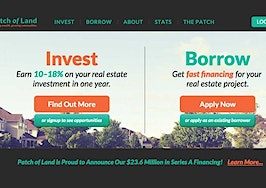Real estate crowdfunding, the practice of pooling money online from investors to purchase property, is still a new concept and, though relatively intuitive, can be difficult to wrap your head around.
Investors and real estate professionals interested in learning more about the financing method can visit a new online resource center unveiled by CrowdRabbit, a website that aggregates investment opportunities made available by a range of crowdfunders.
Robert Finlay, CEO of CrowdRabbit’s parent company, QuietStream Financial, said in a statement that the center provides the “greatest need” in crowdfunding: “reliable, credible educational resources.”
The information hub provides explainers on crowdfunding for investors, capital seekers and aspiring crowdfunders, along with regular articles from experts on the industry.
Home flippers, homebuilders or other real estate firms looking to tap crowdfunding for financing can learn how to launch and maintain a crowdfunding campaign by perusing the resource center.
And investors interested in using real estate crowdfunders to buy shares of properties or pitch in to loans that will finance the purchase of property can use it to learn how to choose an investment, assess risk and get a handle on regulations governing crowdfunding.
Leading real estate crowdfunders include Fundrise, iFunding and RealtyMogul.
Real estate crowdfunding has begun to emerge as a viable alternative to traditional financing, growing by 56 percent in 2014 to just over $1 billion in funding volume, with campaigns ranging in size from less than $100,000 to over $25 million, according to a recent report.
The financing technique iterates on its offline ancestor, “real estate syndication,” by bringing more access and transparency to the marketplace.
By putting investments online, real estate crowdfunders can draw in more potential investors and sell shares in properties for hundreds or thousands of dollars, instead of the hundreds of thousands typically needed to buy into deals engineered through traditional real estate syndication.
Real estate crowdfunding also makes it easier for investors to keep tabs on their investments through online dashboards.
Fundrise, for example, lets investors view monthly leasing updates, photos of a property, construction invoices and geotechnical reports. The crowdfunder also shows customers the identities of their co-investors, displaying headshots with links to LinkedIn profiles pages.







